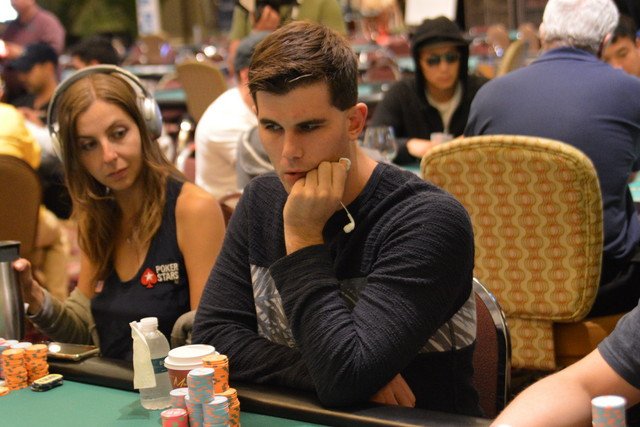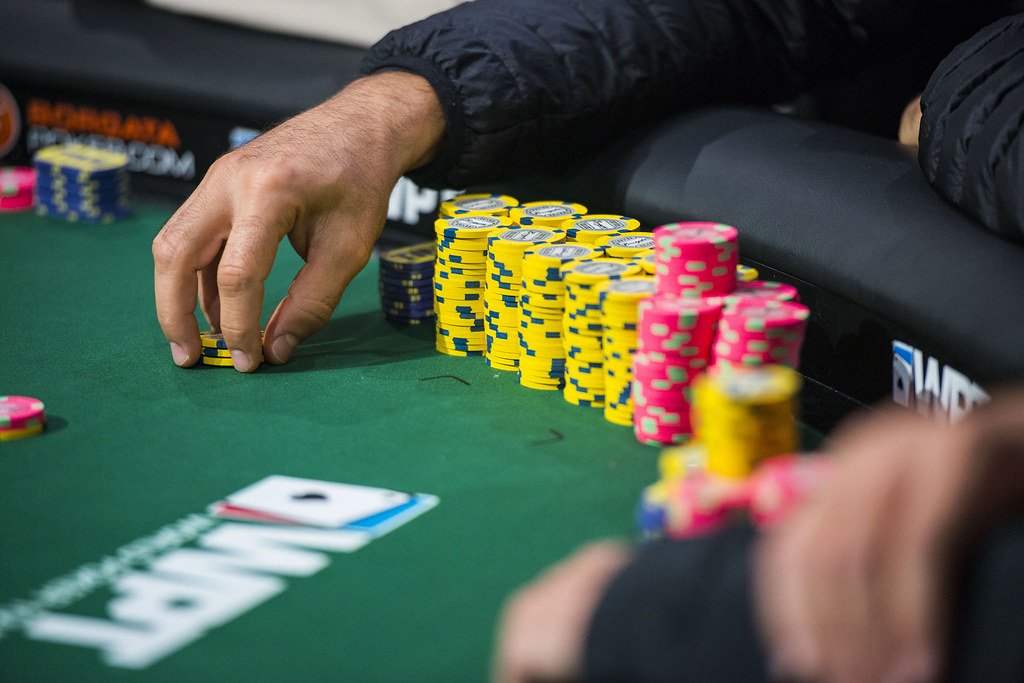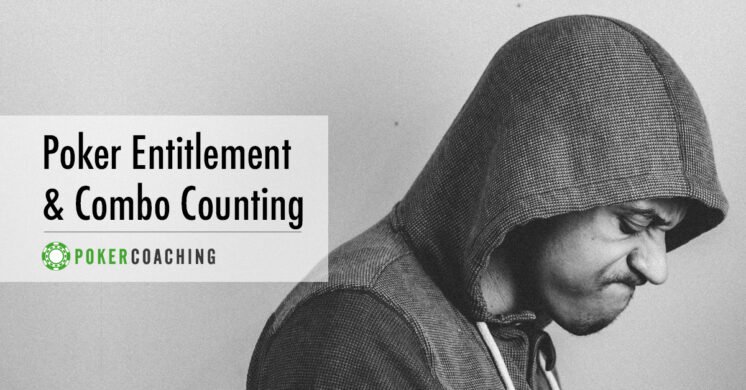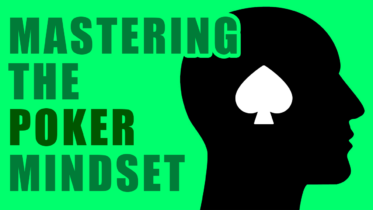I’m playing in the WPT Borgata Open. A player I’ve always considered tight opens from UTG+1 to 2.5X the big blind. In the time he and I have played, I have never once seen him bluff. I have instead seen him pot control constantly. It seems like the worst thing that could ever happen to him is that a hand gets out of control.
A middle position player calls. The cutoff calls. I look down at As-9d. I call from the big blind. The board comes Qc-5h-7h. I check, for obvious reasons. It gets checked around. The turn is an offsuit ace.
Sometimes, I would lead here. Especially if I consider the initial opener to be looser, and unable to fold a 7-6 or 9-9 that he checked multiway.
I don’t want to lead and have the nittier early position raiser call me. If that happens, I will be forced to check most rivers. When I do that, I will have capped my range. Most players will intuitively understand that I would lead the river with most two pair or better combinations, so they will know I have a missed draw or one pair. This is bad for me, considering that’s exactly what I have.
Here’s what you’ll find below:- Today, I’m not playing that guy
- The most important question to ask yourself is…
- The next part of this puzzle
- Then, it occurred to me: This hand holds a secret.
- This is poker entitlement, pure and simple.
Today, I’m not playing that guy.
Live poker is a different game too. When that ace rolled off on the turn, I stole a sideways glance at the initial raiser. He looked quite interested now that that card rolled off.
I check. The early position raiser bets now. Middle position and cutoff fold. It’s on me. I call.
The river is an offsuit deuce. I check to the early position raiser, the nittier pot controller.
There’s around 20,000 tournament chips in the pot. He looks at them. He goes to his chips. He thumbs his stack for a second, rifling up and down. He grabs ten thousand in 5k chips. He puts them on the felt next to his stack. Then, he thinks for a second more. He has a look like, “Oh oops, I forgot something.” He decides to rifle his 1k chips again. Thumbing them, he decides to grab four more of them. He puts his whole bet together now. 14,000 in all. He slides it into the middle. It has taken him no less than 15 seconds to put together his river bet. Almost immediately I throw my hand into the muck.
Tell me, how did that last sentence make you feel? It shouldn’t make you feel close to anything, because this is a clear fold.
First off, if you do want to call here, what is the most important thing to be thinking of? Honestly, ask yourself, what should you be thinking of? What is the most important question to ask yourself? Then, what is the answer to that question? If we’re not putting these logic puzzles together we’re really going to struggle on the felt.
The most important question to ask yourself is…
“Does he do this with X?” and X is the best hand that you beat. If he doesn’t bet X, then it stands to reason you don’t beat anything!
In this case, X would be A-8s. That seems like quite the stretch. Does this nittier player even open A-8s from early position? We don’t know. Does a pot controlling style player value bet top pair with the fifth kicker twice in a multiway pot? That sounds like even more of a stretch.
But okay, let’s say he’s opening 15% of hands, which would be about the minimum we’d need to give him to include suited aces. Well, now, if we include A-10o+ (which would be in that range) we need to count all those combos.
The way this works isn’t “well he could have A-10o, but we beat A-8s” That makes it sound like it’s one hand versus one hand. That’s not how poker ranging works.

So, let’s say you think on this river, he value bets A-6s and better. Most pot controllers don’t do that in multiway pots, but for the sake of the argument let’s say this one does. Alright. Well, we have one ace in our hand and there’s one on the board. He probably bets queens on the flop and checks back fives and sevens. So, what that means is, once we account for card removal, he’s betting eight combinations of AK, eight of combinations of AJ, eight combinations of A-10, one combo of A-5, one combo of A-7, TWO combinations of A-8s, and TWO combinations of A-6s. The all-caps were there to help you see what we possibly could be beating. That’s 26 combinations we can reasonably count against us and a whopping four that are in our favor.
The next part of this puzzle
If we’re counting suited and unsuited combinations of a two-different-cards hand at the beginning of this analysis, then there are 16 combinations of it: 12 unsuited combinations of the hand and four suited ones. So, if you’re counting A-10 suited and unsuited, that’s sixteen combinations at the start of the hand. A-8s, instead, would only have four, because tight players don’t open A-8o from early position. You see the problem we’re running into now?
You then ask how likely it is for each combination to be in his range. We’re losing on the scoreboard 26 to 4, and I don’t even know if we can count those four. This is looking pretty bad.
So, if we can’t beat any hand that he’s value betting really, we need to ask ourselves: Is he bluffing there ever?
Poker players always want to see bluffs that aren’t there because folding means consenting to a loss. No one wants to let another man beat them. This is referred to as loss aversion. If you want to be a professional gambler, there should be no more fascinating topic for you. But that is a topic for another day.
What bluffs could this person have? He’s a pot controller and tighter, so he’s not leading into three players on that turn with nothing. So, he needs to be betting at least a draw. Due to how tightly we have him opening preflop, the only draws he can have are flush draws. By the way, if you’re combo counting, each flush draw combination you can think of, such as J-Ts of hearts, is exactly one whole combo.
We can’t count those hands either because we’ve never seen this guy bluff before. Also, there’s a strong possibility that he would have bet those flush draws on the flop. We’re stuck again.
Finally, his behavior on the river is extremely alarming. When people are bluffing on the river, they tend to grab the chips and put them in. It’s like jumping off a cliff into a river. They get their nerve up and do it. They don’t hem and haw.
When a guy does take his time there and plays with his chips for so long, that doesn’t scream bluff or thin value bet. There’d be some tension in those bets. Bluffers tend to not want to do anything that could look suspicious. So rifling your chips for 20 seconds and annoying everyone at the table doesn’t exactly fit that MO. More likely, this is an awful attempt to feign weakness when hand values are set and the man knows he has the joint.
For these reasons, I thought it was a clear fold, and I didn’t really think of it much afterward.
Then, it occurred to me: This hand holds a secret.

So, I started making this hand a quiz for poker players. I changed the kicker in my hand to a 3 make it even easier. I slipped in clues. I tried to help students along.
None of them could find the fold on the river. No matter how many times I said, “we’ve NEVER seen this guy bluff, he is a SERIOUS pot controller” they would still go on calling on the river. When I asked them why they did that, they couldn’t articulate why they slid their money into the middle.
What I have come to learn about people and poker players, in general, is that while people say they’re using logic to make decisions what they’re actually doing is letting their emotions tilt them one way or another.
Letting your emotions lead the way isn’t necessarily a bad thing.
There was a case where a man had his emotional center in the brain destroyed, and he wasn’t a cold calculating cardsharp by the end of it. Instead, he wouldn’t show up for his kid’s baseball games (because he felt nothing for his child) and it would take him three hours to decide on breakfast cereal in the morning. We need the push and pull of our emotions throughout most of the day. They only become a burden to us when we play cards, and our loss aversion is gutting us of valuable chips.
This river call was 14 big blinds. Most great tournament players make 10 big blinds per 100 hands. It takes three hours to play 100 hands live. 14 big blinds it’s like throwing away four hours of work. For the hell of it.
The truth is, most people call on the river because “I have top pair with a good kicker, and I’m only calling two bets.” I used to say that to myself as well.
This is poker entitlement, pure and simple.
I used to say that to myself because I was entitled. I didn’t want to see reality on reality’s terms. I wanted my hand to be good, so I made it a good hand in my mind by sticking to generalizations as opposed to combination counting.
The only way to get rid of poker entitlement and to not allow yourself to be gamed is to work harder than the other guy. You need to fight fire with fire and replace emotion with emotion. If you counted the combinations appropriately in this hand, you would be disgusted with yourself if you called the river. That’s a powerful motivator. That’s what we need. We need to work up to that.
When I played this hand, I thought through it in the way you’re reading today. I wasn’t born being able to combination count, however. I was able to work through this hand subconsciously while I consciously looked for the player’s physical tells because I’ve been practicing for over a decade. Whenever I get home from a tournament, I pick a hand and work through it. I think about the combinations. I do the math. I quiz myself. I started coaching because it allowed me to monetize my study time. It also gave me a platform to share my conclusions, so I could receive helpful criticism on my thought processes.
I believe anyone can play No-Limit Hold’em profitably because in my high school I got smoked by everyone when I played cards. I was a terribly mediocre pro when I came on the scene. I was a D math student in school. The junior college I applied to told me I had to go back to ninth grade math. Combination counting is not that hard to understand it just takes good old-fashioned work to get to. That’s how you avoid poker entitlement. That’s how you see reality for what it actually is.




I so appreciate all the content you supply to us players who are serious about upping our game. Please keep it coming, love that you are on pokercoaching also. I have tried to digest and apply almost everything you and Jlittle produce. IMO You are a good balance to each other, sometimes with differing perspectives, but clear explanations for why you see it the way you do. I missed meeting you when you came out to Stones a few years ago, (a sad story but still a good card room)and I was the regular guest that kept being persistent that you were a valuable coach/commentator to come and share with us. I had to be out of town when you were here, (bummer) but still looking forward to meeting you in person when we hit out of corona jail. Thanks again for your valuable contributions to our poker community.
This was a very informative article.
Was calling with A9o the recomended play ?
The charts I’m looking at and using say no.
Not being critical.
Just curious.
Great article, this is the level of thinking I am working towards being second nature, and more of an instinct than a process. Is it wrong of me to conclude his starting hand from early position, given the line he took, to be QQ? The 10k bet he got ready would have been a nice bet for two pair with AQ, but adding an extra 4k is suspecious, betting closer to 3/4 pot I believe was made to look like a bluff, because half pot was too much of an obvious value bet. Even as I write this it occurred to me that it is possible for him to have AA also. Or is this just a continuation of me always giving too much credit when only a little bit was needed?